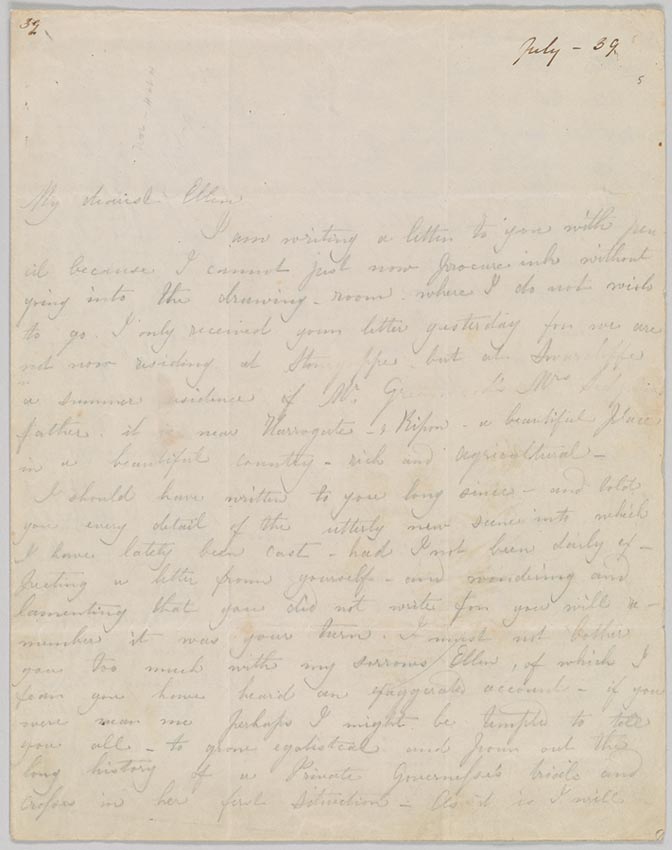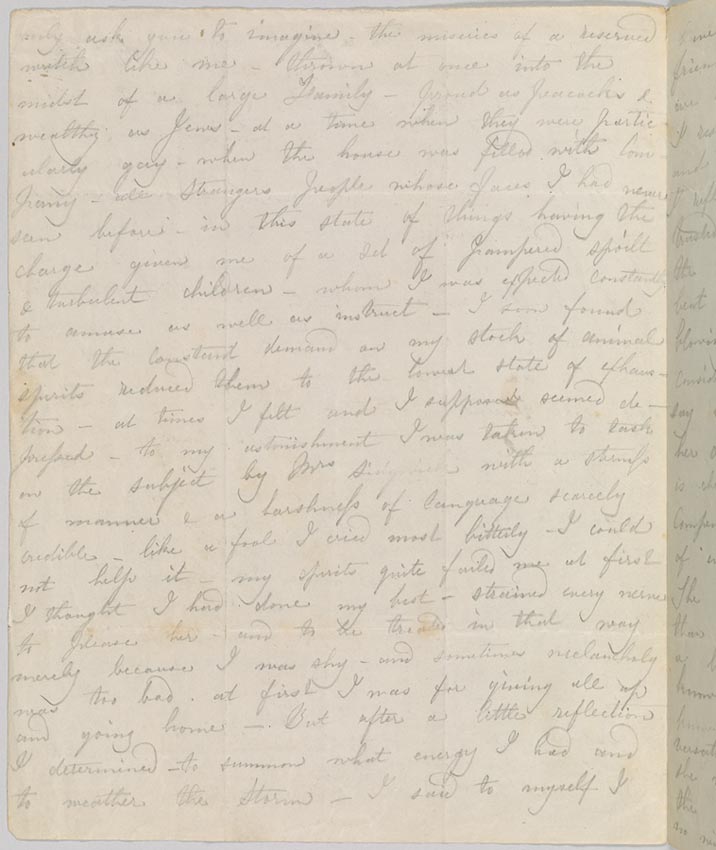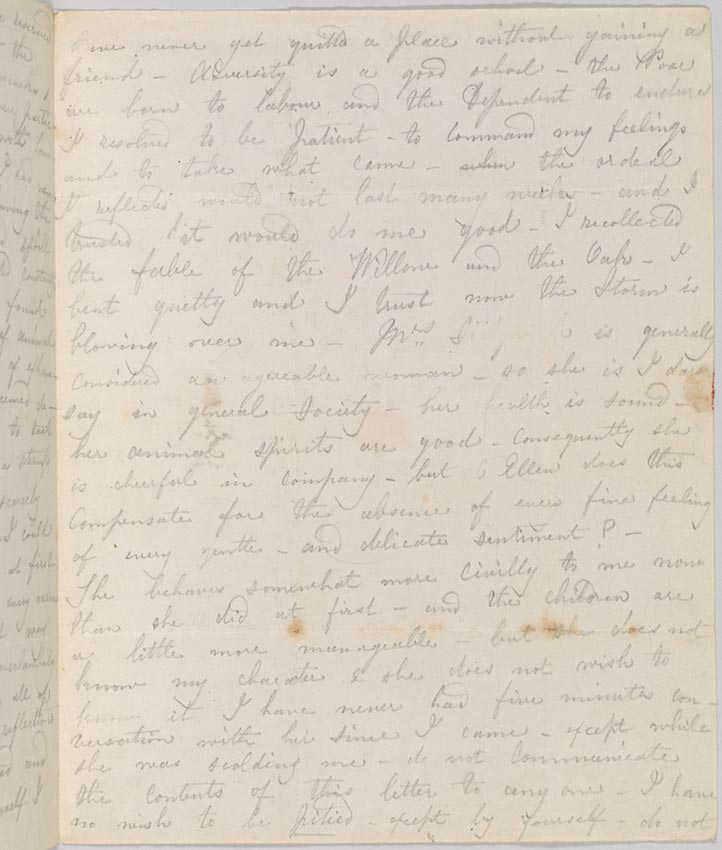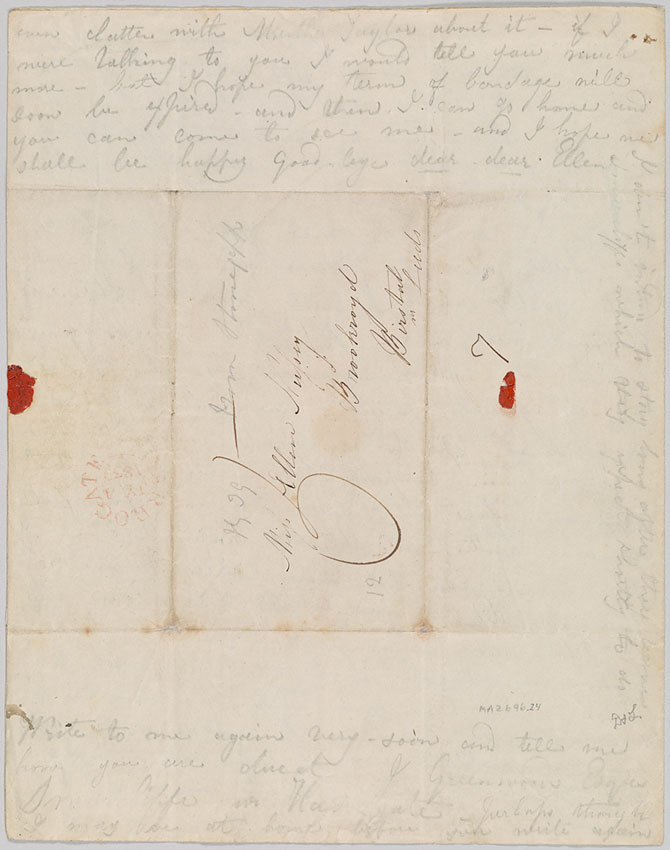3. Letter to Ellen Nussey, 30 June 1839, page 1

Letter to Ellen Nussey, dated Swarcliffe, Harrogate, 30 June 1839
Henry H. Bonnell Collection, bequest of Helen Safford Bonnell, 1969
Brontë spent a few months during the summer of 1839 caring for what she called the “riotous, perverse, unmanageable cubs” of the Sidgwick family. Not only did she detest the work, she felt awkwardly marginal within the family circle. She was so ill at ease that she preferred to write this letter (to her close friend Ellen) in pencil rather than venture into the drawing room to procure some ink.
My dearest Ellen
I am writing a letter to you with pencil because I cannot just now procure ink without going into the drawing-room – where I do not wish to go. I only received your letter yesterday for we are not now residing at Stonegappe – but at Swarcliffe a summer residence of Mr Greenwood’s Mrs Sidgwick’s father – it is near Harrogate – & Ripon – a beautiful place in a beautiful country – rich and agricultural –
I should have written to you long since – and told you every detail of the utterly new scene into which I have lately been cast – had I not been daily expecting a letter from yourself – and wondering and lamenting that you did not write for you will remember it was your turn. I must not bother you too much with my sorrows Ellen, of which I fear you have heard an exaggerated account – if you were near me perhaps I might be tempted to tell you all – to grow egotistical and pour out the long history of a Private Governesse’s trials and crosses in her first Situation – As it is I will
Letter to Ellen Nussey, 30 June 1839, page 2

Letter to Ellen Nussey, dated Swarcliffe, Harrogate, 30 June 1839
Henry H. Bonnell Collection, bequest of Helen Safford Bonnell, 1969
Brontë spent a few months during the summer of 1839 caring for what she called the “riotous, perverse, unmanageable cubs” of the Sidgwick family. Not only did she detest the work, she felt awkwardly marginal within the family circle. She was so ill at ease that she preferred to write this letter (to her close friend Ellen) in pencil rather than venture into the drawing room to procure some ink.
only ask you to imagine the miseries of a reserved wretch like me – thrown at once into the midst of a large Family – proud as peacocks & wealthy as Jews – at a time when they were particularly gay – when the house was filled with Company – all Strangers [–] people whose faces I had never seen before – in this state of things having the charge given me of a set of pampered spoilt & turbulent children – whom I was expected constantly to amuse as well as instruct – I soon found that the constant demand on my stock of animal spirits reduced them to the lowest state of exhaustion – at times I felt and I suppose seemed depressed – to my astonishment I was taken to task on the subject by Mrs Sidgwick with a stern[n]ess of manner & a harshness of language scarcely credible – like a fool I cried most bitterly – I could not help it – my spirits quite failed me at first [–] I thought I had done my best – strained every nerve to please her – and to be treated in that way merely because I was shy – and sometimes melancholy was too bad. At first I was for giving all up and going home –. But after a little reflection I determined – to summon what energy I had and to weather the Storm – I said to myself I
Letter to Ellen Nussey, 30 June 1839, page 3

Letter to Ellen Nussey, dated Swarcliffe, Harrogate, 30 June 1839
Henry H. Bonnell Collection, bequest of Helen Safford Bonnell, 1969
Brontë spent a few months during the summer of 1839 caring for what she called the “riotous, perverse, unmanageable cubs” of the Sidgwick family. Not only did she detest the work, she felt awkwardly marginal within the family circle. She was so ill at ease that she preferred to write this letter (to her close friend Ellen) in pencil rather than venture into the drawing room to procure some ink.
have never yet quitted a place without gaining a friend – Adversity is a good school – the Poor are born to labour and the Dependent to endure[.] I resolved to be patient – to command my feelings and to take what came – when the ordeal I reflected would not last many weeks – and I trusted it would do me good – I recollected the fable of the Willow and the Oak – I bent quietly and I trust now the Storm is blowing over me – Mrs Sidgwick is generally considered an agreeable woman – so she is I daresay in general Society – her health is sound – her animal spirits are good – consequently she is cheerful in company – but O Ellen does this compensate for the absence of every fine feeling of every gentle – and delicate sentiment? –
She behaves somewhat more civilly to me now than she did at first – and the children are a little more manageable – but she does not know my character & she does not wish to know it[.] I have never had five minutes conversation with her since I came – except while she was scolding me – do not communicate the contents of this letter to any one – I have no wish to be pitied – except by yourself – do not
Letter to Ellen Nussey, 30 June 1839, page 4

Letter to Ellen Nussey, dated Swarcliffe, Harrogate, 30 June 1839
Henry H. Bonnell Collection, bequest of Helen Safford Bonnell, 1969
Brontë spent a few months during the summer of 1839 caring for what she called the “riotous, perverse, unmanageable cubs” of the Sidgwick family. Not only did she detest the work, she felt awkwardly marginal within the family circle. She was so ill at ease that she preferred to write this letter (to her close friend Ellen) in pencil rather than venture into the drawing room to procure some ink.
even chatter with Martha Taylor about it – if I were talking to you I would tell you much more – but I hope my term of bondage will soon be expired – and then I can go home and you can come to see me – and I hope we shall be happy[.] Good-bye dear – dear Ellen
Write to me again very – soon and tell me how you are [–] direct J Greenwoods Esqre Swarcliffe nr Harrogate – perhaps though I may be at home before you write again I don’t intend to stay long after they leave Swarcliffe which they expect shortly to do
[the letter is unsigned]